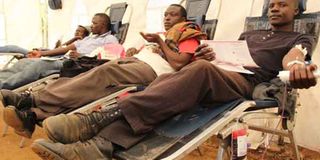Kenya faces acute blood shortage

Eldoret residents during a blood donation drive in the town, September 23, 2013. Kenya is facing an acute shortage of blood for patients seeking services in different hospitals and in emergency cases. Photo | JARED NYATAYA | File
What you need to know:
- On Friday, Dr Oduor said the country only had 2,848 litres of blood in stock countrywide which was equivalent to two days' stock.
- WHO director-general said if all obstetric facilities provided safe blood for transfusion, many of the mothers’ who died could have been saved.
Kenya is facing an acute shortage of blood for patients seeking services in different hospitals and in emergency cases.
The country only has 2,848 litres of donated blood countrywide which is equivalent to two days' stock, the director of the Kenya National Transfusion Service (KNTS), Dr Margaret Oduor revealed Friday.
The shocking revelation come at a time when the World Health Organisation (WHO) is appealing for countries to improve access to safe blood for saving the lives of mothers as it celebrates World Blood Donor Day on Saturday.
“Blood needs for the country is estimated to be 400,000 units (pints) annually. Over the years collection of blood at KNBTS has steadily increased from 40,000 units in 2004 to 170,000 units in 2013 and continues to rise. NBTS targets to collect between 16,500 to 33,300 unit monthly ,” Dr Oduor said.

Graphic | RACHEL OMBAKA
She said that as the country prepares to mark the World Blood Donor Day, all KNBTS regional and satellite centres shall remain open for donations and appealed to Kenyans to come out in large numbers and donate blood.
“The national celebrations will be held in Nairobi at Uhuru Park from 8.00am to 5.00pm. The Guest of Honour shall be Her Excellency the First Lady of the Republic of Kenya, Mrs Margaret Kenyatta,” she said.
She added that Mombasa shall also hold regional celebrations at Taifa grounds.
BIRTH COMPLICATIONS
WHO said in a statement that every day, almost 800 women die from causes related to complications of pregnancy and childbirth.
The global health organisation said severe bleeding during pregnancy, delivery or after childbirth is the single biggest cause of maternal death and can kill a healthy woman within two hours if she is unattended. Urgent access to safe supplies of blood for transfusion is critical to saving these women’s lives.
“When a new mother dies, not only does her baby face greater risk of death, malnourishment and lifelong disadvantage, but the whole family’s wellbeing is affected,” WHO director-general, Dr Margaret Chan, said.
The WHO director-general said if all obstetric facilities provided safe blood for transfusion, many of the mothers’ who died could have been saved.
Dr Chan said the safest source of blood is from regular, voluntary unpaid donors whose blood is screened for infections.
A World Health Assembly resolution in 2010 highlights that a secure supply of safe blood components, based on voluntary, non-remunerated blood donation, is an important national goal to prevent blood shortages.
“Today, in many low- and middle-income countries, blood supply is critically inadequate. Sub-Saharan Africa, which has the highest maternal mortality rate in the world of 510 deaths per 100 000 live births, also has the lowest blood donation rates,” the WHO statement said.
According to the latest WHO survey on blood safety and availability, 40 African countries collect less than 10 blood donations per 1000 population per year; of these, 25 countries collect less than half the blood that they need to meet transfusion requirements.
High-income countries collect around 35 donations per 1000 population per year.
It adds that in many countries, family members are often pressured to donate blood or find a replacement donor in an emergency situation.
This causes emotional and financial stress and significant delays in obtaining suitable blood, and also puts women at risk of blood borne infections as there is often no time or facilities to properly screen the donated blood.
“Safe blood transfusion is one of the key life-saving interventions that should be available in all facilities that provide emergency obstetric care,” Dr Edward Kelley, Director of Service Delivery and Safety at WHO said.
Dr Kelly said n 2014, equitable access to safe blood for obstetric care still remains a major challenge, contributing to high maternal mortality in many countries.
Currently, 73 countries collect more than 90 per cent of their blood supply from voluntary unpaid blood donors (38 are high-income countries, 26 middle-income countries and 9 low-income countries).
About 108 million blood donations are collected worldwide every year. Almost half of these are collected in high-income countries, home to just 15 per cent of the world’s population.
WHO says in low-and middle-income countries, a high proportion of blood supplies are needed for the management of complications of pregnancy and childbirth as well as for treating severe childhood anaemia.
In high-income countries, blood transfusion is most commonly used in heart surgery, transplant surgery, trauma and cancer therapy.
WHO maintains that providing safe and adequate supplies of blood and blood products should be an integral part of every country’s efforts to improve maternal health.




